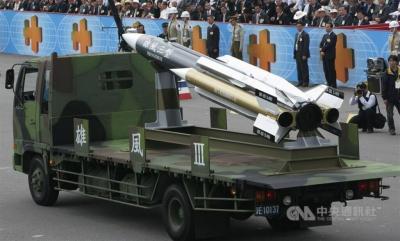Efforts to conserve the endangered Formosan landlocked salmon have made progress, with artificially bred fish now spawning in their natural habitat in northeastern Taiwan, national park administrators said yesterday.
“Juvenile Formosan landlocked salmon that were released into the Sihjielan Stream (司界蘭溪) and the Luoyewei Stream (羅葉尾溪) on the border of Yilan and Taichung counties a few years ago have fared well and are now spawning,” said Chung Ming-shan (鍾銘山), deputy superintendent of the Shei-Pa National Park Headquarters.
“The discovery is encouraging, as it marks a step forward in our drive to preserve the precious fish, which harks back to the Ice Age,” Chung said. “It’s truly a miracle in the history of biology.”

PHOTO COURTESY OF SHEI-PA NATIONAL PARK ADMINISTRATION
Saying that the species traditionally inhabits slow-flowing streams with gently sloping beds at elevations of more than 1,500m, Chung added that the fish is now found mainly in the Cijiawan Stream (七家灣溪) and Gaoshan Stream (高山溪) in the upper stretches of the Dajia River (大甲溪), with the total population exceeding 2,300.
As the fish had been spotted in streams in the Yilan-Taichung border area prior to the 1970s, Chung said the Shei-Pa National Park’s conservation researchers have since 2006 regularly released young and juvenile fish into the Luoyewei and Sihjielan streams.
“Through monitoring, we have found that those fish have survived in the two streams and been able to breed naturally,” Chung said.
He said, however, that many fish perished or were washed away during several typhoons last year.
Late last year, park researchers released more than 100 young fish into the Sihjielan and Luoyewei streams, and they have been growing well, Chung said.
“Although Typhoon Morakot wreaked havoc in southern Taiwan’s mountainous regions in early August, the storm did not affect the Formosan landlocked salmon’s habitat in central Taiwan,” he said, adding that his office would continue to release young fish to reduce the possibility of the species going extinct while increasing the biodiversity of streams in the region.

STATS: Taiwan’s average life expectancy of 80.77 years was lower than that of Japan, Singapore and South Korea, but higher than in China, Malaysia and Indonesia Taiwan’s average life expectancy last year increased to 80.77 years, but was still not back to its pre-COVID-19 pandemic peak of 81.32 years in 2020, the Ministry of the Interior said yesterday. The average life expectancy last year increased the 0.54 years from 2023, the ministry said in a statement. For men and women, the average life expectancy last year was 77.42 years and 84.30 years respectively, up 0.48 years and 0.56 years from the previous year. Taiwan’s average life expectancy peaked at 81.32 years in 2020, as the nation was relatively unaffected by the pandemic that year. The metric

Taiwan High Speed Rail Corp. (THSRC) plans to ease strained capacity during peak hours by introducing new fare rules restricting passengers traveling without reserved seats in 2026, company Chairman Shih Che (史哲) said Wednesday. THSRC needs to tackle its capacity issue because there have been several occasions where passengers holding tickets with reserved seats did not make it onto their train in stations packed with individuals traveling without a reserved seat, Shih told reporters in a joint interview in Taipei. Non-reserved seats allow travelers maximum flexibility, but it has led to issues relating to quality of service and safety concerns, especially during

A magnitude 5.1 earthquake struck Chiayi County at 4:37pm today, the Central Weather Administration (CWA) said. The hypocenter was 36.3km southeast of Chiayi County Hall at a depth of 10.4km, CWA data showed. There were no immediate reports of damage resulting from the quake. The intensity of the quake, which gauges the actual effect of a seismic event, measured 4 in Chiayi County, Tainan and Kaohsiung on Taiwan's seven-tier intensity scale, the data showed. The quake had an intensity of 3 in Chiayi City and Yunlin County, while it was measured as 2 in Pingtung, Taitung, Hualien, Changhua, Nantou and Penghu counties, the data

The Supreme Court today rejected an appeal filed by former Air Force officer Shih Chun-cheng (史濬程), convicted of Chinese Communist Party (CCP) espionage, finalizing his sentence at two years and two months for contravening the National Security Act (國家安全法). His other ruling, a ten-month sentence for an additional contravention, was meanwhile overturned and sent to the Taichung branch of the High Court for retrial, the Supreme Court said today. Prosecutors have been notified as Shih is considered a flight risk. Shih was recruited by Chinese Communist Party (CCP) intelligence officials after his retirement in 2008 and appointed as a supervisor